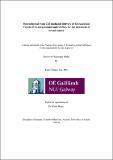| dc.description.abstract | Mesenchymal Stem Cells (MSCs) hold the ability to home to the site of the
tumour and bypass the host immune system. Extracellular Vesicles (EVs) are
thought to be a fingerprint of the parent cell and therefore MSC-EVs may
retain these cancer targeting properties and immune privilege. The
development of a novel MSC-EV therapeutic for breast cancer in parallel with
a diagnostic approach using circulating EV-miRNAs shows strong potential.
However limited research has focused on the impact of EV administration on
the host immune system. Therefore, this study aimed to determine whether
MSC-EV administration in immunocompetent animals would initiate a host
immune response, and to analyse secreted EV-microRNAs in vitro and in
vivo.
Secreted EVs were isolated from the serum of tumour-bearing animals, and
the conditioned media of breast cancer cells or MSCs by differential
centrifugation, microfiltration and ultracentrifugation. EVs were
characterised by western blot, transmission electron microscopy and
nanoparticle tracking analysis. EV-miRNA expression was analysed using
next generation sequencing (NGS) and RQ-PCR. Immune competent Balb/c
mice bearing 4T1 breast tumours, or healthy control animals, received an IV
injection of either murine or human MSC-EVs. Following sacrifice, tumours,
draining lymph nodes and spleens were digested into a single cell suspension
and flow cytometry analysis performed targeting a range of immune cell
markers for T cells, B cells, Myeloid Derived Suppressor Cells (MDSC) and
natural killer (NK) cells.
Small EVs (30-150nm) were successfully isolated with the appropriate lipid
bilayer and expression of CD63 and CD81 confirmed. There was no
significant correlation between the number of circulating EVs (6.34 x 109 –
1.30 x 1010) and protein yield (181.2 – 1914.5μg/mL; R2 =0.26, p= 0.3).
However, a moderate correlation between tumour burden and the number of
circulating EVs was observed (R2 =0.386, p=0.047). Although miR-16 was
detected in all serum EVs, wide variation suggested it would not make a stable
endogenous control. NGS analysis of 4T1 breast cancer cells and secreted
EVs revealed the presence of 242 miRNAs. 72 miRNAs were expressed at
significantly higher levels in the EVs, with a number of these validated by
RQ-PCR. When immune response to tumour growth was analysed in vivo,
increased T cells and MDSCs and decreased NK cells were observed. More
importantly however the proportion of T cells, B cells, MDSCs, Dendritic
cells and NK cells remained stable in the tumour, draining lymph node and
spleen of all tumour-bearing/healthy control animals that received either
human or murine MSC-EVs, with no significant change detected.
EVs contain a range of miRNA that could potentially help monitor tumour
burden and therapeutic efficacy. The data presented supports the hypothesis
that MSC-EVs retain the immune privilege of the secretory cell, with human
cell-derived EVs eliciting no immune response in mice. This is a promising
step forward for MSC-EV therapy and reinforces the potential for the use of
EVs in the cancer setting. | en_IE |


